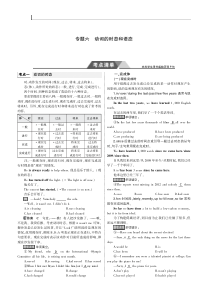 PDF
PDF
【文档说明】高考英语一轮复习(课标版天津适用B版)教师用书:专题六 动词的时态和语态PDF版含答案.pdf,共(6)页,957.035 KB,由envi的店铺上传
转载请保留链接:https://www.doc5u.com/view-b159a314fed30d874be967dd44db023e.html
以下为本文档部分文字说明:
专题六动词的时态和语态对应学生用书起始页码P78考点一动词的时态时:动作发生的时间(现在、过去、将来、过去将来)。态(体):动作所处的状态(一般、进行、完成、完成进行)。四个时间、四种状态构成了英语的十六种时态。要
求掌握的主要有八种:一般现在时、一般过去时、一般将来时、现在进行时、过去进行时、现在完成时、过去完成时、过去将来时。另外,现在完成进行时和将来进行时也成了常考的内容。体时现在过去将来过去将来一般∗一般现在时∗一般过去时∗一般将来时∗过去将来时进行∗现在进行时
∗过去进行时∗将来进行时过去将来进行时完成∗现在完成时∗过去完成时将来完成时过去将来完成时完成进行∗现在完成进行时过去完成进行时将来完成进行时过去将来完成进行时注:一般现在时、现在进行时、现在完成时、现在完成进行时都是指“现在”的情况。Heisalwaysreadytohelpothers.
他总是乐于助人。(现在的状态)Hehasturnedoffthelight.(=Thelightisoffnow.)他关灯了。Theconcerthasstarted.(=Theconcertisonnow.)音乐会开始了。—Look!Somebodythesof
a.—Well,itwasntme.Ididntdoit.A.iscleaningB.wascleaningC.hascleanedD.hadcleaned答案C句意:———瞧!有人把沙发擦了。———哦,不是我。我没有擦。考查动词时态。根据itwasn
tme可知,擦沙发是已经发生过的事,并且“Look!”说明说的是现在的情况,故用现在时,排除B、D;A项表示现在正在进行,不符合句意要求。现在完成时表示该动作对目前所造成的影响,即现在沙发很干净。单项填空:①Myfriend,whoDontheInternationalOlympicCommitt
eeallhislife,isretiringnextmonth.A.servedB.isservingC.hadservedD.hasserved②WhenIfirstmetBryanIdidntlikehim,butIAmymind.A.ha
vechangedB.changeC.hadchangedD.wouldchange一、完成体(一)现在完成时用于强调过去发生或已经完成的某一动作对现在产生的影响,说的是和现在有关的情况。1.in/over/during
thelast/pastfew/fiveyears通常与现在完成时连用。Inthelasttwoyears,wehavelearned1,000Englishwords.在过去的两年里,我们学了一千个英语单词。单项填空:③In
thelastfewyearsthousandsoffilmsBallovertheworld.A.haveproducedB.havebeenproducedC.areproducingD.arebeingproduced2.since后接过去的时间点或引导一般过去时态
的从句时,句子/主句常用现在完成时。Wehavelearned1,000wordssincewecamehere/since2009/sincethen.自从我们来到这里/从2009年至今/从那时起,我们已经学了一千个单词了。Itis/
hasbeen3yearssincehecamehere.他来这里已经三年了。单项填空:④Thereportswentmissingin2012andnobodyCthemsincethen.A.seesB.
sawC.hasseenD.hadseen3.for+时间段,lately,recently,upto/tillnow,sofar常和现在完成时连用。Sofarwehavedonealottobuildalow⁃carboneconomy,buti
tisfarfromideal.为了构建低碳经济,到目前为止我们已经做了很多,但还远不够理想。单项填空:⑤—Haveyouheardabouttherecentelection?—Sure,itCtheonlythingonthenewsforthelastthreedays
.A.wouldbeB.isC.hasbeenD.willbe⑥—Irememberyouwereatalentedpianistatcollege.Canyouplaythepianoforme?—Sorry,ICthe
pianoforyears.A.dontplayB.wasntplayingC.haventplayedD.hadntplayed�
�专题六动词的时态和语态53⑦Formanyyears,peopleBelectriccars.However,making
themhasbeenmoredifficultthanpredicted.A.haddreamedofB.havedreamedofC.dreamedofD.dreamof⑧Uptonow,theprogramDthousandsofchildrenwhowouldotherwisehav
edied.A.wouldsaveB.savesC.hadsavedD.hassaved⑨SofarthisyearweDafallinhousepricesbybetween5and10percent.A.sawB.seeC.hadseenD.haveseen4.主将从现适用于时间状语从句(wh
en,before,assoonas)和条件状语从句(if,unless)。(1)用一般现在时表将来含义,即从句用一般现在时,主句常用一般将来时。Illtellyouassoonashecomesback.他一回来我就告诉你。(2
)用现在完成时代替将来完成时,表达“将来完成某事之后的情况”。Whenyouhavefinishedyourhomework,Illtakeyoutothepark.做完作业后,我就带你去公园。单项填空:⑩If
weCtoprotecttheenvironment,welllivetoregretit.A.hadntactedB.haventactedC.dontactD.wontact
Bythetimeyouhavefinishedthisbook,yourmealCcold.A.getsB.hasgotC.willgetD.isgetting(二)过去完成时表示在过去的一个动作或时间之前完成的事情。1.使用
过去完成时的两个条件:(1)在句中有过去的时间或过去的时态;(2)在过去的时间或过去的时态之前完成的事,才能用过去完成时,即“过去的过去”。ShehadlearnedsomeEnglishbeforeshecametotheinstitute.她在来学院前已学过一些英语。Hes
aidthathehadbeenabroadfor3years.他说他在国外待了3年了。单项填空:(2014北京,32)IfoundthelecturehardtofollowbecauseitDwhenIarrived.A.st
artedB.wasstartingC.wouldstartD.hadstartedShewassurprisedtofindthefridgeempty;thechildBeverythin
g!A.hadbeeneatingB.hadeatenC.haveeatenD.havebeeneatingHewasunhappywhenhesoldhisguitar.Afterall,heBitforaverylongtime.A.hashadB.
hadhadC.hasD.hadWearrivedatworkinthemorningandfoundthatsomebodyBintotheofficeduringthenight.A.brokeB.hadbrokenC.hasbroken
D.wasbreaking2.“by+时间点”常与完成时连用:结构时态例句bytheendofnextyear/week/month...将来完成时Bytheendofnextyear,wellhavelearned2,000Englishwords.bynow现在完成时Bynowweh
avelearned1,500Englishwords.bythenbytheendoflastyear/week/month...bythetime...过去完成时Bythetimehecameback,wehadlearned1,000E
nglishwords.单项填空:—Tommyisplanningtobuyacar.—Iknow.Bynextmonth,heDenoughforausedone.A.savesB.savedC.willsaveD.willha
vesavedWhenItalkedwithmygrandmaonthephone,shesoundedweak,butbythetimeweCup,hervoicehadbeenfulloflife.A.werehangingB.hadhung
C.hungD.wouldhangBythetimeJackreturnedhomefromEngland,hissonDfromcollege.A.graduatedB.hasgraduatedC.hadbeengraduatingD.hadgraduated3.和完成时
连用的句型(1)表示“这是某人第一/二……次做……”This/Itisthefirst/second...timethatsb.hasdoneThat/Itwasthefirst/second...timethatsb.haddoneThis
isthefirsttimethatIhavebeentoBeijing.这是我第一次去北京。ThatwasthefirsttimethatIhadbeentoBeijing.那是我第一次去北京。单项填空:ThisisthefirsttimeweDafilminthe
cinematogetherasafamily.A.seeB.hadseenC.sawD.haveseen(2)表示“刚……就……”Hardly/Scarcely/Barelyhad...done...
when...(一般过去时)Nosoonerhad...done...than...(一般过去时)Hardly(Nosooner)hadIgothomewhen(than)therainpoureddown.我刚到家雨就倾盆而下。(3)表示愿望、打
算一类的词:hope,expect,mean,intend,want,think,suppose等,其过去完成时可表示过去未曾实现的愿望或意图。
545年高考3年模拟B版(教师用书)IhadhopedtoseemoreofShanghai.我本希望在上海多看看。(但未能如愿)Iha
dthoughtyouwouldcometomorrow.我原以为你明天来。二、完成进行体现在完成进行时:have/hasbeendoing(到现在)一直在……现在完成进行时表示一个动作开始于过去,持
续到现在,往往强调现在还在进行。Hehasbeenlookingforhislostchild.他一直在找他丢失的孩子。注意:在时间状语从句中常用现在完成进行时代替将来完成进行时。单项填空:(2014江西,24)—Tony,whyareyoureyesred?—IDu
ppeppersforthelastfiveminutes.A.cutB.wascuttingC.hadcutD.havebeencuttingWeBonthisprojectforfourhours.Le
tshavearest.A.areworkingB.havebeenworkingC.workedD.hadworkedIwonttellthestudenttheanswertothemathproblemuntilheAonitf
ormorethananhour.A.hasbeenworkingB.willhaveworkedC.willhavebeenworkingD.hadworkedThegirlhasagreati
nterestinsportandDbadmintonclassestwiceaweekoverthelastthreeyears.A.tookB.istakingC.takesD.hasbeentakingThemanagerCtheworkershowtoimprovethepr
ogramsince9am.A.hastoldB.istellingC.hasbeentellingD.willhavetoldInordertofindthemissingchild,villagersDall
theycanoverthepastfivehours.A.didB.doC.haddoneD.havebeendoingWhenAlicecameto,shedidnotknowhowlongsheAthere.A.hadbeenlyingB.hasbeenlyingC.was
lyingD.haslainThenumberofforeignstudentsattendingChineseuniversitiesCrisingsteadilysince1997.A.isB.ar
eC.hasbeenD.havebeen(2014湖南,28)Sincethetimehumankindstartedgardening,weBtomakeourenvironmentmorebeautiful.A.tryB.havebeentr
yingC.aretryingD.willtry三、一般体所谓一般体,表示既不“进行”,又不“完成”的一般或正常状态。一般体中的一般现在时和一般过去时分别表示现在和过去的经常性、习惯性动作或状态。Wehavemealsthre
etimesaday.我们一日吃三餐。(现在的习惯)WhenIwasaboy,Ioftenwenttoplayinthatpark.我小时候常去那个公园玩。(过去的习惯)(一)一般过去时1.指过去的情况或所处的状态,或表示过去经常发生的动作。常见的时间状语有:yesterday,j
ustnow,lastnight/week/year,in2016,theotherday,3daysago,thedaybeforeyesterday等。Hecamehereyesterday.昨天他来这里了。2.往往表示“刚才,刚刚”之意,常暗示现在已“不再
这样”。—Comeonin,Peter.Iwanttoshowyousomething.—Oh,howniceofyou!Ineverthoughtyouweregoingtobringmeagift.———Peter,过来呀。我
想给你看点东西。———哦,你真是太好了!我从没想过你会给我带礼物。Yourphonenumberagain?Ididntquitecatchit.再说一遍你的电话号码,好吗?我刚才没听清楚。3.在时间状语从句和条件状语从句中,代替过去将来时
。单项填空:—Youlookverytired.Catalllastnight?—No,notreally.Imtiredoutnow.A.DoyousleepB.WereyousleepingC.Didyouslee
pD.HadyousleptOh,itsyou!IArecognizeyou.A.didntB.dontC.hasntD.hadntImcallingabouttheapartmentyouAtheotherday.Couldyoutellm
emoreaboutit?A.advertisedB.hadadvertisedC.areadvertisingD.willadvertise—Whataboutyourself⁃drivet
ripyesterday?—Tiring!Theroadwasbeingwidened,andweAaroughride.A.hadB.haveC.wouldhaveD.havehadIAinLondo
nformanyyears,butIveneverregrettedmyfinaldecisiontomovebacktoChina.A.livedB.waslivingC.havelivedD.hadlived(二)一般现在时1.表
示经常性、习惯性的动作或存在的状态,客观真理,科学事实等。常见的时间状语有:always,usually,everyday/year/morning/night,sometimes,often等。Igotos
chooleveryday.我每天上学。(现在的习惯)Heisalwayslikethat.他总是那样。(现在的状态)2.表示按时间表、规定、计划或安排将要发生的动作。3.在时间、条件、让步状语从句中表示将来。
专题六动词的时态和语态55单项填空:IBallthecookingformyfamil
y,butrecentlyIvebeentoobusytodoit.A.willdoB.doC.amdoingD.haddoneAroundtwooclockeverynight,Suewillstarttalkinginherdream.It
somewhatAus.A.bothersB.hadbotheredC.wouldbotherD.botheredOnMondaymorningsitusuallyAmeanhourtodrivetoworkalthoughtheactualdista
nceisonly20miles.A.takesB.istakingC.tookD.willtakeWalmart,whichisoneofthelargestAmericansupermarketchains,Asomeofitsstoresope
n24hoursonMondaysthroughSaturdays.A.keepsB.keepC.havekeptD.hadkeptPlanningsofaraheadCnosense—soma
nythingswillhavechangedbynextyear.A.madeB.ismakingC.makesD.hasmadeEveryfewyears,thecoalworkersBtheirlungsX⁃rayedtoensuret
heirhealth.A.arehavingB.haveC.havehadD.hadhad(三)一般将来时和过去将来时1.“begoingtodo”常表示“计划/打算/即将做某事”,也可表示“根据现在的迹象,对未来进行推断”。2.betodo与beabouttodo结构含义及用法例句betodo1
)表示按计划或安排要做的事2)表示“注定”1)Whenareyoutoleaveforhome?你什么时候回家?2)Heistobeagoodsinger.他注定会成为一名优秀歌手。beabouttodo1)正要做
……2)通常不与具体的时间状语连用,但可与when连用,构成beabouttodo...when...1)Thetrainisabouttostart.火车就要开了。2)Iwasabouttogooutwhenitrained.我正要出去,天突然下雨了
。3.will表示“事先未经过计划就立刻去做某事”。Tomisill?Illgotoseehim.汤姆病了?我去看看他。单项填空:Inaroomabovethestore,whereapartyA,somework
erswerebusilysettingthetable.A.wastobeheldB.hasbeenheldC.willbeheldD.isbeingheld(2014北京,31)—Whattimeisit?—Ihaven
oidea.Butjustaminute,ICitforyou.A.checkB.checkedC.willcheckD.wouldcheck“Whatdoyouwanttobe?”askedMrs
Crawford.“Oh,IDpresident,”saidtheboy,withasmile.A.havebeenB.amC.wasD.willbe四、进行体(一)所表示的语法概念1.表示现在或当时发展中的或正在进行的情况。IfirstmetLily3yea
rsago.Shewasworkingataclothesshopatthetime.三年前我第一次遇到了莉莉。当时她正在一家服装店工作。—Isthiscoatyours?—No,mineishangingtherebehindthedoor.———这是你的外套吗?———不是,我的在门后挂着呢。
2.表示动作的未完性、暂时性。—Haveyoumovedintothenewhouse?—Notyet.Theroomsarebeingpainted.———你搬进新房了吗?———还没呢。房间还在粉刷呢。(未完性)Idontreallyworkhere;I
amjusthelpingoutuntilthenewsecretaryarrives.我不在这里上班。我只是来帮忙,直到新秘书来了(我就走)。(暂时性)(二)进行体的种类1.现在进行时:am/is/aredoing—Whatareyoudoing?—Imnotdoinganyt
hingatpresent.———你在干什么?———我现在什么也没干。(1)现在进行时常用的时间状语:now,atpresent,atthismoment,thesedays等。单项填空:(2014北京,22)—Hi,letsgoskati
ng.—Sorry,Imbusyrightnow.ICinanapplicationformforanewjob.A.fillB.havefilledC.amfillingD.willfillHurryu
p!MarkandCarolBus.A.expectB.areexpectingC.haveexpectedD.willexpect—Joan,whatBinyourhand?—Look!Itsabirthdaygiftformy
grandma.A.hadyouheldB.areyouholdingC.doyouholdD.willyouhold—Hi,Terry,canIuseyourcomputerforawhil
ethisafternoon?—Sorry.C.A.ItsrepairedB.IthasbeenrepairedC.ItsbeingrepairedD.IthadbeenrepairedThe
yarelivingwiththeirparentsforthemomentbecausetheirownhouseA.A.isbeingrebuiltB.hasbeenrebuiltC.isrebuiltD.hasrebui
lt(2)always,continually,constantly与进行时连用,表达感情色彩,如:高兴、赞赏、厌恶、遗憾等。Heisalwaysthinkingofothersfirst.他总是先想到他人。Heisalwaysmakingthesamemistake.他总是犯同样的错误。
565年高考3年模拟B版(教师
用书)(3)部分动词或动词词组的进行时表“将来”之意,这些动词或动词词组有:come,go,arrive,leave,begin,start,takeoff等。Imcoming!我就来!Theambulanceisarrivin
g.救护车就来。单项填空:Ladiesandgentlemen,pleasefastenyourseatbelts.TheplaneB.A.takesoffB.istakingoffC.hastakenoffD.tookoff
WeCveryearlysowepackedthenightbefore.A.leaveB.hadleftC.wereleavingD.haveleft2.过去进行时:was/weredoing(1)表示过去某一时刻或时段正在进行的动作或所处的状
态。(2)过去进行时常用的时间状语:then,atthattime,thosedays等。Iwaspractisingtheviolinateightoclockyesterdayevening.昨天晚上八点钟我练小提琴来着。Mybrotherfellwhenhewa
sridinghisbicycleandhurthimself.我弟弟骑自行车时从车子上掉了下来,伤了自己。Oh,Iwastalkingtomyself.哦,我是在自言自语。—Hey,lookwhereyouarego
ing!—Oh,Imterriblysorry.Iwasntnoticing.———嘿,看你走到哪儿去了!———哎呀,实在对不起。我没注意。单项填空:—DidyoucatchwhatIsaid?—Sorry.IDatextmessagejustnow.A.hadans
weredB.haveansweredC.wouldanswerD.wasanswering(2014四川,9)SheCsomeone,soInoddedtoherandwentaway.A.phonedB.hadphonedC.wasp
honingD.hasphoned—Idontunderstandwhyyoudidntgotothelectureyesterdayafternoon.—Imsosorry.ButIBmyhomework
.A.haddoneB.wasdoingC.woulddoD.amdoing—Isthereanythingwrong,Bob?Youlooksad.—Oh,nothingmuch.Infact,IBofmyfriendsbackhome.A.
havejustthoughtB.wasjustthinkingC.wouldjustthinkD.willjustbethinking—Whendidthecomputercrash?—Thismornin
g,whileIBthereadingmaterialsdownloadedfromsomewebsites.A.havesortedB.wassortingC.amsortingD.hadsorted3.将来进行时:willbedoing表示将来某一时间点或时间段正在进行的动作,常表示事情的
正常发展。DanielsfamilywillbeenjoyingtheirholidayinHuangshanthistimenextweek.下周的这个时候丹尼尔一家将在黄山度假。单项填空:—CanIcallyou
backattwooclockthisafternoon?—Imsorry,butbythenICtoBeijing.Howaboutfive?A.flyB.willflyC.willbeflyingD.amflyingIfeelso
excited!AtthistimetomorrowmorningIAtoShanghai.A.willbeflyingB.willflyC.havebeenflyingD.haveflown—Guesswhat
,wevegotourvisasforashort⁃termvisittotheUKthissummer.—Hownice!YouAadifferentculturethen.A.willbeexperiencingB.haveexp
eriencedC.havebeenexperiencingD.willhaveexperienced�
�考点二动词的语态一、被动语态由“助动词be+过去分词”构成。助动词be随着主语的人称、数以及句子时态的变化而变化。几种常见时态的被动语态形式见下表:时体现在过去将来过去将来一般is/am/aredonewas/weredonewill/shallbedone
would/shouldbedone进行is/am/arebeingdonewas/werebeingdone——完成have/hasbeendonehadbeendone——完成进行————单项填空:①Thelett
ersforthebossAonhisdeskbuthedidntreadthemuntilthreedayslater.A.wereputB.wasputC.putD.hasput②—Haveyouheardaboutthatfireint
hemarket?—Yes,fortunatelynooneB.A.hurtB.washurtC.hashurtD.hadbeenhurt③Afterschoolwewenttothereadingroomtodosomereading
,onlytobetoldthatitD.A.wasdecoratedB.haddecoratedC.hadbeendecoratingD.wasbeingdecorated专题六动词
的时态和语态57④ExperimentsofthiskindDinboththeU.S.andEuropewellbeforetheSecondWorldWar.A.haveconductedB.havebeenconductedC.hadconductedD.hadbeencondu
cted二、主动形式表被动意义1.系动词look,sound,smell,taste,feel,appear,seem,go,prove,turn,become,fall,get,grow,keep,stay+形容词/名词构成系表结构。Thesteelfeelscold.钢摸起
来很凉。Ithasgonebad.这个东西已经变质了。Thisdishtastesdelicious.这道菜尝起来味道很美。2.表示主语的某种属性特征的动词,如:read,write,act,iron,cut,draw,drive,sell,wash,clean,wear,open,cook,lo
ck,shut,dry,eat,drink等一般不单独使用,常有一个修饰语。Thecoatdrieseasily.这件外衣容易干。Yourarticlereadswell.你的文章读起来很不错。Thedoorwontope
n(lock).这门打不开(锁不上)。用所给词的适当形式填空:⑤Theclothfeels(feel)goodandsells(sell)well.对应学生用书起始页码P841.明确时态是一种动词形式;建立时、体概念(“时”即现在时、过去时、将来
时、过去将来时;每个时又分四个“体”,即一般体、进行体、完成体、完成进行体)。2.在把握时态实质含义的基础上,解决时态和语态问题时,要遵循“活化语境,设身处地”的八字方针和以下解题思路:(1)定“时”(确定说的是什么时候的事情或情况);(2)定“体”(确定这个动作处于什么状态,
是完成了,还是未完成,还是既不表完成又不表进行);(3)定“语态”(确定这个动词与主语之间的关系,是主动还是被动)。